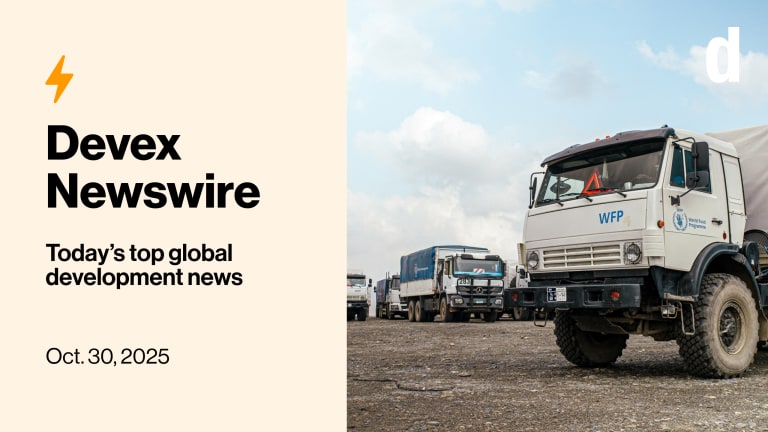
On Friday, a panel of world leaders appointed by the United Nations proposed a highly anticipated framework for stamping out extreme poverty by 2030.
The recommendations are a dramatic shift from the Millennium Development Goals, which expire at the end of 2015. They call for a ‘data and information revolution’ and put transparency and accountability at the heart of this new framework.
As you might expect, we welcome this report and particularly the increased focus on transparency.
One of the main reasons these goals were not met was because of failure to include proper measurements. However, a focus on improved data and an independent and rigorous monitoring system will mean, for the first time, that policymakers and citizens will be able to track progress of the new goals and hold their governments accountable for their actions. This will establish far clearer links between resource allocation, service delivery and real development outcomes.
U.K. Prime Minister David Cameron, who sits on the panel with President Susilo Bambang Yudhoyono of Indonesia and President Ellen Johnson Sirleaf of Liberia, has positioned himself firmly at the centre of this agenda.
We applaud the High-Level Panel for recognizing the critical importance of transparency. Its call for an “international initiative to improve the quality of statistics and information available to citizens” has the potential to be genuinely transformative.
We at Publish What You Fund believe that this process should start with better information about aid — for two reasons.
First, the new Development Goals will be global targets. Responsibility for delivery lies with every nation (as well as with the collective global community), not just with governments of developing countries. It is essential that aid donors — both bilateral and multilateral — practice what they preach in terms of good governance, transparency, accountability and citizen participation.
The new goals can only be met effectively if aid providers work better in partnership with recipient governments and citizens alike. Lack of clarity about the aims and purposes of development aid made it much harder to coordinate efforts to achieve the existing MDGs. In some instances, opaque and fickle donor behaviour effectively cut developing country governments out of the loop.
Second, there is already a precedent for transparent publication of aid data, in the form of the International Aid Transparency Initiative (IATI). This is the only existing system for making international data quickly accessible to everyone, in a comparable format. According to our 2012 Aid Transparency Index, the U.K. Department for International Development is currently the most transparent aid donor. Given David Cameron’s prominent role in the process so far, it would be a missed opportunity if UK does not use its leadership role to promote IATI as a key component of the proposed data and information revolution.
IATI is a cutting-edge global standard which offers a common standard for publishing aid information. It satisfies our four pillars of transparent aid, ensuring data is published in a manner that is timely, comprehensive, accessible and comparable. These are all crucial, as only then can donor aid spending be mapped and properly aligned with the recipient country’s domestic budget.
Publication of aid information to IATI is a flagship transparency initiative for the U.K. government, with DfID publishing to the highest standard. This means we are able to point to the UK as an example for other large donors — such as the U.S. — as an example of how they should be publishing their aid information.
A lot has changed since the 2015 goals were agreed. We have faced a global financial crisis and increasing political instability. For that reason, transparency, public accountability and citizen engagement in this agenda are even more critical. Poor economic growth is a reason to prioritize transparent and accountable financing for the development agenda.
Access to information can potentially transform the relationship not only between citizens and governments, but also between donors and recipients. Open data for all to use has the power to reduce corruption, improve decision-making and allocation of resources, empower citizens and support good governance, all prerequisites for creating local ownership and responsibility and ultimately, successful poverty reduction.
U.K. Prime Minister David Cameron has been clear that the common thread running through all these international development events is transparency, openness and accountability. But now he needs to show imagination and perseverance to promote that agenda, so that it will deliver change and real outcomes.
Making aid more effective is a crucial part of the High-Level Panel’s goal to end extreme poverty by 2030. So is good governance and the data and information revolution. Now that they have been put onto the global agenda, it is vital that the next set of development goals are based around them, with clear mechanisms to make sure they happen. The International Aid Transparency Initiative can play a major role. It is an opportunity that must not be wasted.
Join the Devex community and access more in-depth analysis, breaking news and business advice — and a host of other services — on international development, humanitarian aid and global health.
Search for articles
Most Read
- 1
- 2
- 3
- 4
- 5








